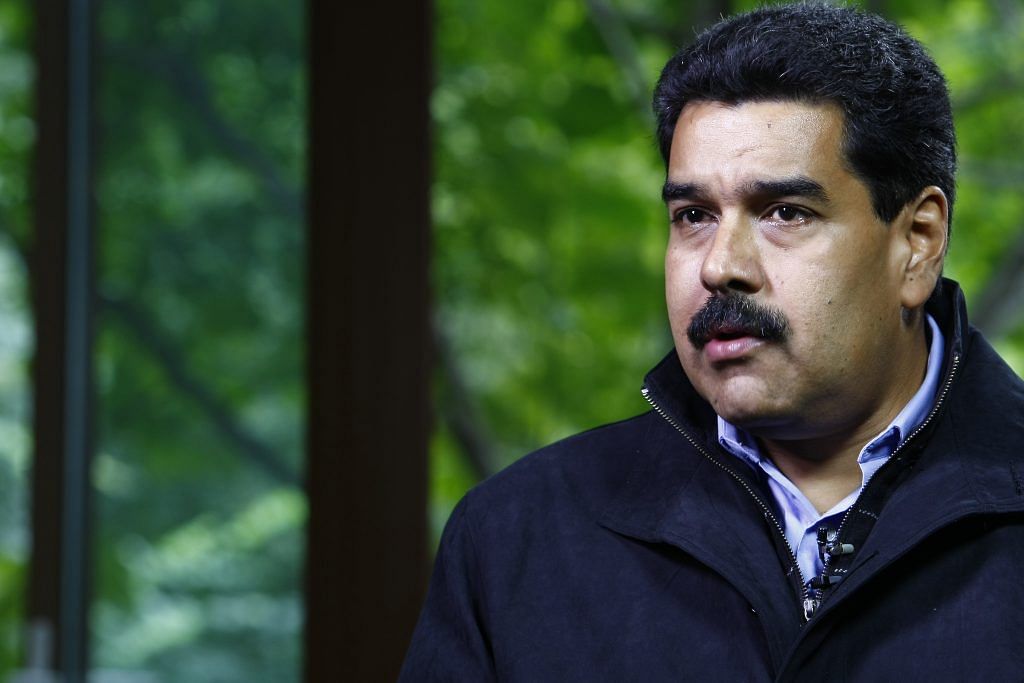Hugo Chávez’s besieged successor will land in Delhi Saturday, hold bilateral talks with PM Modi.
New Delhi: Venezuelan President Nicolas Maduro will be among the 28 heads of state and government due to arrive in New Delhi this weekend for the first-ever International Solar Alliance summit.
During the visit, Maduro, who lands on Saturday, will hold bilateral talks with Prime Minister Narendra Modi, their first so far.
No Chávez
Maduro, 55, rose to the presidency in the Latin American nation following the death of the wildly popular Hugo Chávez in 2013.
Chávez led Venezuela from 1999 to 2013, a vocal critic of the US as well as capitalism, imperialism and colonialism.
On his visit to India in 2005, he so charmed students at Delhi’s Jawaharlal Nehru University (JNU) that his death eight years later left the campus in tears.
That March 13 years ago, his fans at JNU had greeted him with a ‘lal salaam’ in Spanish. In return, Chávez had regaled them with a popular Venezuelan song.
In fact, Chávez was so overwhelmed by his popularity that he refused to leave the podium despite having other engagements.
Maduro has struggled to fill his shoes. He has drawn much flak for lacking Chávez’s charisma, and his rule has seen Venezuela descend into its worst economic crisis.
Why is Venezuela important?
Venezuela is one of the largest producers of oil in Latin America, with oil sales making up 50% of the country’s GDP and 95% of its export revenue. Venezuela is the fourth largest supplier of oil to India.
“In 2001, seven per cent of oil imports in India were from South America, out of which Venezuela contributed four per cent. In 2016, South America contributed about 15 per cent and Venezuela alone contributed 10 per cent,” said Lydia Powell, who heads the Centre for Resources Management at the Observer Research Foundation (ORF).
The US factor
Following a round of financial sanctions in 2017, the US has been considering imposing sanctions on Venezuela’s military-run oil companies and restricting insurance coverage for its oil shipments.
But former diplomat M.K. Bhadra Kumar said any such decisions are likely to affect New Delhi’s relationship with Caracas.
“For the US, Venezuela is its backyard, and it has got its specific concerns and motivations. The sanctions are not a part of global politics; it is more or less bilateral, from the American point of view,” he said.
India, he added, could not afford to overlook Venezuela in terms of the oil trade. “China, Russia and Iran are all very active in their trade with Venezuela, and India will be interested too,” Kumar said.
“Anything that comes up in terms of the formulation of world energy policies, Venezuela has a big say, and India naturally would want to be a interlocutor,” he added.
Is the US competing with Venezuela?
America is a growing competitor for Venezuelan oil sales.
“Now, American oil companies are also operating in a big way; they are energy sufficient, their dependence has come down a bit, and they are playing political games,” diplomat Kumar said.
India imports hard crude from Venezuela, which is cheaper than the light crude the US currently exports. Also, the refineries in India are equipped to process the hard crude.
The US, Powell of the ORF said, is also emerging as a crude exporter, two years after it removed a 40-year ban on crude exports.
“They are now a net exporter of crude and they are looking for a market and India has one of the largest growths in demand,” she said.
“The US has a surplus of light crude now and North and South America are competing for a market share in India,” Powell added.
However, Kumar said the Americans would not be able to erode the Venezuelan market in India. “The US is looking for an entirely different type of market in terms of LNG. The US’ competitors would be Australia and increasingly Russia, not Venezuela,” he said.
